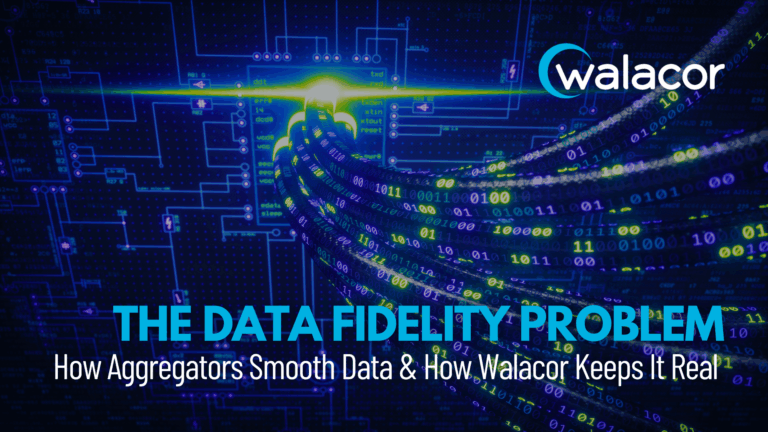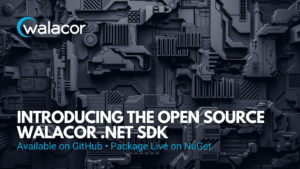
The Age of Aggregated Truth
Most enterprises buy a substantial amount of enrichment data from third party sources. Financial signals, demographic profiles, healthcare outcomes, retail behavior, even “AI-ready” training corpora, all come packaged and polished from third-party data brokers. Can you trust what the brokers give you doesn’t introduce bias? Has the data been manipulated?
Somewhere between the field, the sensor, and the spreadsheet, that truth undergoes smoothing: outliers adjusted toward an average, missing points interpolated, volatility minimized. The result is clean, consistent, and ready to import, but not necessarily the truth.
This is the hidden cost of convenience in the data economy. What you gain in usability, you lose in fidelity. Walacor exists to reverse that equation.
The Smoothing Problem: When Data Becomes a Product
“Data smoothing” sounds innocuous, even helpful. It’s a statistical process intended to remove “noise” or “inconsistency” across datasets. In practice, it’s what allows aggregators to market uniform data products at scale.
They smooth for three reasons:
- Normalization — to make disparate data sources fit a unified schema.
- Completeness — to fill gaps where the original data is sparse or incompatible.
- Presentation — to meet service-level agreements and make charts, reports, and APIs look stable.
But smoothing introduces distortion. Each “correction” alters the data’s signal, pulling every edge case toward a targeted mean. The problem isn’t that smoothing happens; it’s that it happens invisibly. There’s no trace of the original value, no declaration of transformation, and no ability to reconstruct what was lost. In visual terms: the image has been airbrushed, and the source negatives have been destroyed.
The Fidelity Gap: When Good-Enough Data Becomes Dangerous
Loss of fidelity leads to loss of accountability.
- Predictive models trained on smoothed data produce confident but wrong outcomes.
- Compliance teams can’t reproduce the data pipeline that produced a given result.
- Regulators can’t audit how a number changed hands.
The damage compounds quietly. Entire industries start making decisions based not on facts, but on functions. The smoothing algorithms themselves become unacknowledged actors in the enterprise.
For consulting firms and data-driven organizations, this is no longer an abstract risk, it’s an existential liability. Their reputations rest on insights derived from unverifiable data. Once the fidelity is gone, it’s not recoverable. There is no mathematical path back to the raw signal.
Walacor: Immutable Lineage for a High Fidelity Future
Walacor was designed to eliminate this blind spot. It’s not a new data warehouse, and it’s not another analytics layer. It’s a cryptographic integrity engine that enforces traceability at the object level.
Every dataset ingested through Walacor is sealed in a cryptographic envelope, hashed, and recorded with its provenance metadata. Each transformation — aggregation, merge, normalization, or enrichment — emits a lineage event, creating an immutable chain of custody.
This means:
- Any modification to a dataset, including a smoothing operation, must declare itself.
- Every downstream object inherits its lineage, ensuring end-to-end traceability.
- Both row-level and set-level integrity are preserved without revealing sensitive content.
The result is secure data, not just secure storage. Where traditional security protects access to data, Walacor protects the truth of data itself.
The Walacor Data Tracker: Open-Source Oversight
Many organizations understand the fidelity problem but lack the infrastructure to solve it. That’s why Walacor built the Walacor Data Tracker, a lightweight, open-source tool for verifying lineage across your own datasets or those you receive from third parties.
The Data Tracker runs directly on top of the Walacor protocol and offers both CLI and SDK interfaces:
- Cryptographic Validation — verify that incoming data matches its declared content hash.
- Transformation Detection — detect unauthorized or undeclared smoothing operations.
- Schema Tracking — monitor changes in structure, not just content.
- Pipeline Integration — plug into Python-based ETL/ELT processes or Node.js workflows.
Enterprises can self-host it, and embed it in CI/CD pipelines. Major consulting firms are already piloting similar systems internally, not because it’s fashionable, but because their clients now demand verifiable lineage. Walacor Data Tracker gives them a head start providing auditable, cryptographically sound data lineage.
The Aggregator Reckoning & Opportunity
The data brokerage ecosystem is at an inflection point. For decades, aggregators monetized opacity, blending, smoothing, and reselling data behind contractual NDAs. But regulators, clients, and AI risk officers are beginning to ask a new question. Can you prove that your data is what you say it is?
With Walacor, they can.
Aggregators can still provide value through curation and enrichment, but they must do so transparently, with declared transformations and verifiable provenance. Walacor doesn’t replace aggregators; it makes them accountable.
From Aggregation to Accountability
The new data covenant is simple. Buyers shouldn’t have to trust that data is accurate; they should be able to verify it. With Walacor:
- Every dataset is an object of record, immutable, traceable, reconstructible.
- Every transformation is an enumerated event, not a hidden operation.
- Every stakeholder, from data engineer to external auditor, has cryptographic proof of integrity.
This transforms “compliance” from a checkbox into an architectural property of the system, by design.
Fidelity Is the New Currency
In the coming decade, as AI systems, investment models, and regulatory decisions hinge on data integrity, fidelity itself will become a form of capital. Enterprises that can prove the authenticity of their data will outperform those that can only assume it.
Aggregators will continue to smooth, they always will, but Walacor ensures they can no longer do so invisibly. Because in a world where every decision is data-driven, truth itself becomes infrastructure.
Good enough is not enough, not for secure data, not for the future. Bring fidelity back into your data supply chain and make sure every number you act on can be proven and trusted.


